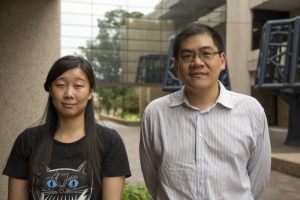Doctoral degrees are awarded every semester in the Cullen College of Engineering, but few to students as accomplished as Ji Qi.
Qi recently defended her doctoral thesis for her electrical engineering Ph.D. and will graduate this fall with her degree. Her dissertation, titled “Advances in Raman and Surface-Enhanced Raman Spectroscopy: Instrumentation, Plasmonic Engineering and Biomolecular Sensing,” was presented to a faculty committee which included John Wolfe, Zhu Han, Kirill Larin, Richard Willson and ECE chairman Badri Roysam while her advisor and committee chair, Wei-Chuan Shih, looked on.
Raman spectroscopy is a powerful technique for label-free molecular sensing and imaging in various fields. A high molecular specificity, non-invasive sampling approach and the need for little or no sample preparation make Raman spectroscopy uniquely advantageous compared to other analytical techniques. However, Raman spectroscopy suffers from the intrinsic limitation of weak signal intensity. Therefore, time-sensitive studies, such as ones involving medical diagnoses and other clinical applications, require improving the throughput of Raman instrumentation. Alternatively, surface-enhanced Raman scattering (SERS) improves the sensitivity by 10^6 to 10^14 times, making the weak Raman intensity no longer a limitation. Nevertheless, it is still a big challenge to engineer plasmonic substrates with high SERS enhancement, good uniformity and reproducibility.
During her four years as a Ph.D. student in Shih’s laboratory, Qi researched advances in Raman instrumentation towards high-throughput, environmental, biological and biomedical analysis; SERS substrates with high enhancement factor (EF), uniformity and reproducibility; and biosensing applications including imaging of cell population and detection of biomolecules towards high time efficiency and sensitivity.
Although this research could be a full time job, Qi didn’t stop there. During her time as a student, she also worked as a Teaching Assistant and took on an internship with French oil giant, Total. In addition, she published six refereed journal articles as a first author and has two more under review.
“I think that’s a huge accomplishment. I didn’t have eight authored papers when I got my Ph.D. A committee member mentioned that the amount of work she’s done is worth two Ph.D.’s,” Shih said. “Of course I feel proud of her.” Qi also contributed to several other refereed papers in her time at UH.
Qi said the research and extra work was sometimes a challenge, “but it’s ok for me. I’m a hard worker.” Before coming to UH, she spent two years earning her master’s degree in electrical engineering at the University of Arizona. Prior to that, she earned her bachelor’s at Tsinghua University in Beijing, one of the top universities in China. Qi said she is happy her years as a student are coming to a close.
“I’m very excited. I spent four years here and two on my master’s, and I don’t want to be a professor, so it’s enough academia for me. I want to try something different now.” In the fall, she will begin working with Schlumberger as an optics physicist.
